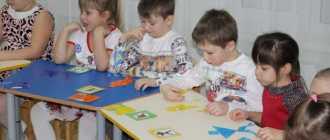Entertaining experiences and experiments as a tool for working with preschool children
In modern realities, teachers and parents have to look for new tools and ways of raising and teaching children. The article describes the experience of a teacher working with preschool children using entertaining experiments that help the child explore the world faster. The author offers several examples of how such experiments can be used in practice.
AND . YU . Gopkalova , teacher at GBPOU School No. 1194 Moscow
Preschool education of children implies an understanding of the characteristics of child psychology. At this age, the formation of the child’s personality occurs. The student constantly communicates not only with parents and other family members, but also with peers in kindergarten and in the yard, with older and younger children.
Sometimes in the process of communication various difficulties arise due to the inability to listen to other people or defend one’s opinion. Competent preschool education of children means constant monitoring of the child, understanding the characteristics of relationships between children. [1]
One of the main responsibilities of a teacher is to develop those qualities that will help the child more easily achieve his goals in the future. One of the problems is the difficulty in developing interest in learning about the world around us in children. The main thing is that the child, both in kindergarten and at home, does not encounter a wall of alienation and feels comfortable and cozy. [2, p. 83]
It is impossible to force a child to do something - he must be passionate about this matter. Therefore, to attract attention, educators come up with something new and exciting. Such “inventions” become a pedagogical tool that a teacher can use if necessary. One of the most informal and interesting tools to interest a child is visual and exciting experiments.
Each child easily finds a variety of objects to study. For children, the entire world around them is a huge laboratory for experiments. With the support of parents and teachers, a child explorer can grow into an excellent adult explorer. Such a person will not only be smart, but also very observant, able to think logically and draw conclusions. He will find a lot of unusual and curious things around him, he will be able to rejoice and be sincerely surprised by everything he sees around him. [3]
The most ordinary, everyday activities will become an excellent simulator for the development of useful skills for a child. For example, by conducting experiments every day and making them a tradition, we try to develop perseverance and curiosity in our students.
A child learns about the world faster when he combines the acquisition of knowledge and exciting, entertaining games. At those moments when children begin to be lazy, conducting experiments can attract their attention and restore curiosity and desire to develop. The result can be obtained by getting the child interested, but without forcing him to do anything against his will.
Children are always eager to learn something new, to be in all places at once and to explore everything around them. In impulses of all-encompassing curiosity, they sometimes mutilate themselves or create a “pogrom” around them. It is important for us to interest the child, to switch his attention to calm, productive, and not destructive activities.
Entertaining experiments are one of the best ways due to their effectiveness - the child will definitely be captivated by what is happening. The format of the experiments itself is already an effective method for developing a scientific style of thinking in students.
Below we offer three examples of the use of entertaining experiments. They have shown themselves to be effective in our practice, so we invite everyone who is interested to try them in their work.
The water cycle in nature and the formation of fog
The experiment is simple but exciting. It will help not only to develop perseverance, but also to clearly show the processes taking place around you, as well as create your own world.
Procedure of the experiment: Place air in a damp plastic bottle and close tightly. Due to temperature and pressure, evaporation inside the bottle increases, and as soon as warm steam meets cold air, real fog is formed.
"A fairy tale for a child"
In the warm season, while walking in the fresh air, you need to collect a bouquet of beautiful flowers (the collecting process helps develop the child’s attentiveness). Then treat each flower with ammonia; over time, the petals will change color and create a real “miracle.” If, in the process of collecting bouquets, the students found dandelions with white caps, they can conduct another exciting experiment. To do this, you need to place a dandelion in water and surprise the children with the fact that the hats will “come out unscathed.”
Nutrients from the soil
An example of this experience can be borrowed from nature, namely the process of plants obtaining nutrients from the soil with the help of roots. For this experiment you will not need real plants or soil, but a bowl of water, paints and paper towels. Children can cut out leaves, flowers or fruits from towels, and then place the edges of the resulting shapes in a bowl of water. Subsequently, the child will be fascinated by the process of coloring figures by absorbing colored water.
Experiments can quickly and easily help wean children off bad habits like soda. To do this, it is necessary to conduct an experiment with the discoloration of children's favorite drinks. All you need is soda and paper napkins. It is necessary to lower the napkin into the glass and leave for several minutes, repeat until the liquid in the glass is completely discolored and all the dye has transferred to the napkins.
In the age of Internet technology, you can find exciting experiences in five minutes. Such research will help in the development of the child, create a memorable, fabulous day filled with impressions, and most importantly, help him understand that learning can be not only a boring, tiring process, but also an exciting adventure.
We believe that fun experiences are a simple way to quickly capture a child's attention and contribute to the development of our students.
Bibliography
- Features of raising preschool children. https://raguda.ru/ds/osobennosti-vospitanija-detej-doshkolnogo-vozrasta.html
- Zelentsova S.A., Zazdravnykh I.I. “Interaction between kindergarten and family in raising a child.” International correspondence scientific conference “Pedagogy: traditions and innovations” Volume I. Chelyabinsk 2011
- Why do children need science experiments and research? https://xn—80aamepirb6d.xn—p1ai/experiments_article.php
- Experiments in biology. “Why are experiments needed?” Municipal budgetary educational institution of additional education. City station for young naturalists. Kemerovo. https://gorsun.org.ru/lib/experiments/intro/.
Teacher's work experience
Experience as a teacher at the Municipal Budgetary Educational Institution "Zap-Khaleyevich Secondary School"
Zakharenko Lyubov Vasilievna on the topic:
“The use of gaming techniques in the formation of elementary mathematical concepts in preschool children”
“Without play there is not and cannot be full-fledged mental development. A game is a huge bright window through which a life-giving stream of ideas and concepts flows into the child’s spiritual world. Play is the spark that ignites the flame of inquisitiveness and curiosity.”
V.A. Sukhomlinsky.
Information about work experience.
Conditions for the experience:
Pedagogical activities are carried out in the preschool group of the MBOU "Zap-Khaleyevich Secondary School". The institution has 1 different age group. There are 18 students in the group.
Introduction.
In preschool age, play is of utmost importance in the life of a small child. The need for play in children continues and occupies a significant place even during the first years of their schooling. In games there is no real conditioning by circumstances, space, time. Children are the creators of the present and the future. This is the charm of the game.
Mathematics plays a huge role in mental education and in the development of intelligence. Currently, in the era of the computer revolution, the common point of view expressed in the words: “Not everyone will be a mathematician” is hopelessly outdated.
Relevance.
Today, and even more so tomorrow, mathematics will be needed by a huge number of people in various professions. Mathematics contains enormous opportunities for developing children's thinking in the process of their learning from a very early age. Visibility, consciousness and activity, accessibility and measure, scientific character, taking into account the age and individual characteristics of children, systematicity and consistency, the strength of knowledge acquisition, the connection of theory with the practice of learning and life, education in the learning process, a variable approach - this is the content completeness that is relevant for the child .
Working in a kindergarten, I set myself the following pedagogical goals: to develop children’s memory, attention, thinking, and imagination, since without these qualities the development of the child as a whole is unthinkable.
I started working on this topic with children in 2013 and continue to this day. While conducting direct educational activities (FEMP), I noticed that not all children answer questions clearly and clearly, they doubt their answers, and their attention and memory are poorly developed.
As a teacher, this alarmed me greatly, and I decided to conduct monitoring, with the help of which I was able to identify children who especially needed my help. The children made mistakes in counting, could not navigate time, and many did not know geometric figures. Studying new pedagogical literature, I came to the conclusion that by using various didactic games and entertaining exercises in my work, I could correct the knowledge gaps in children. I began to work in depth on the topic: “The use of gaming techniques in the formation of elementary mathematical concepts.”
Novelty of experience
consists of using various gaming methods and forms when conducting direct educational activities in mathematics. Didactic games have the opportunity to form new knowledge, introduce children to methods of action, each of the games solves a specific didactic problem of improving children’s ideas.
Duration of work on the experiment.
The study is designed for 5 years (from 2013 to 2022).
Stage 1. Analytical and diagnostic. Conducted: analysis of literary sources, comparison, analysis and generalization of advanced pedagogical experience, collection of information, diagnostics.
Stage 2. Practical. Educational activities were carried out in a unified system - observation; experiment, partial search activity, reproductive, explanatory and illustrative, visual method, individual work.
Stage 3. Analytical – generalizing. Summing up the work: replenishing manuals, attributes for games on the topic being studied, developing recommendations for working with children, summarizing work experience.
To create conditions for children’s creative activity, I replenished the subject-development environment and created card indexes of didactic games. I divided all the didactic games into several groups:
- Games with numbers and numbers
- Time travel games
- Games for spatial orientation
- Games with geometric shapes
- Logical thinking games
Made visual demonstration and handout materials. As a result of the work done, the subject-spatial environment of the group room created conditions for various types of children's activities, interaction of children with each other, which caused a feeling of joy in the pupils, encouraged active creative activity and contributed to the intellectual development of preschool children.
In order to ensure the effectiveness of the educational process, I carried out my work on this topic in four directions:
-work with children
-work with parents
-working with colleagues
-work with society
Work with children
Working in this direction, I tried to arouse children’s interest in entertaining game material with the help of riddles, jokes, entertaining questions, crosswords, puzzles, and puzzles.
When introducing children to numbers, I give various games, such as “Make a number from plasticine”, “What does a number look like”, “Find objects around us that resemble a number”. Children learn to solve mathematical riddles, learn poems about numbers, and get acquainted with fairy tales in which numbers are present.
When learning geometric shapes, children love to play the game “A Pair of Words.” For example: I tell the children: circle - the children name an object that looks like a circle - a steering wheel, a plate; rectangle – picture, door; oval - egg, and vice versa: I name the object, and the children name the shape. I also use the following games: “Close the doors in the houses”, “Pick up a patch”, Children lay out figures, both according to the model and from memory. When fixing geometric shapes, I use the following games: “Geometric Lotto”, “Find and Name”, “Who Lives Where”, “Applique”, “Only One Property”. To develop visual attention, we played the game: “Count how many triangles and circles.”
I very often use games with sticks in my classes: “Creating geometric shapes from counting sticks.” At first I gave simple tasks. For example: lay out a pattern according to a sample, from memory, and then the task became more complicated: she suggested making 2 equal squares from 7 sticks, making a square of two sticks (using the corner of the table).
Knowledge of geometric shapes (oval, circle) can be consolidated in the didactic game “Pick by Shape.” The presenter puts a card with a picture of a circle on the table and says: “Who has round objects?” Each child looks for a round object in their cards - a ball, a button, a watch, a ball, a watermelon, etc. In this game, I carefully monitor the correct selection of geometric shapes, their names, and teach them to find such shapes in the surrounding reality.
Game “Count, don’t be mistaken!” helps to master the order of numbers in the natural series, exercises in forward and backward counting. The game uses a ball. Children stand in a semicircle. Before the game starts, I tell them in what order (forward or reverse) I will count. Then I throw the ball and call the number. The one who caught the ball continues to count further. The game takes place at a fast pace, tasks are repeated many times to give as many children as possible the opportunity to take part in it.
Having introduced the children to the days of the week through the game “Fairy Dwarfs”, she explained that each day of the week has its own name. In order for children to better remember the names of the days of the week, we named each gnome the corresponding day of the week. She told the children that the names of the days of the week indicate which day of the week it is: Monday is the first day after the end of the week, Tuesday is the second day, Wednesday is the middle of the week, Thursday is the fourth day, Friday is the fifth. After such a conversation, I suggested games to reinforce the names of the days of the week and their sequence. Children enjoy playing the game “Live Week”.
I set myself the task of teaching children to navigate in specially created spatial situations and determine their place according to a given condition. Children freely perform tasks like: Stand so that there is a closet to your right and a chair behind you. Sit so that Karina sits in front of you, and Artyom sits behind you. With the help of didactic games “Puss in Boots”, “Imagine a Landscape”, “Architects’ Intentions” and exercises, children master the ability to use words to determine the position of one or another object in relation to another: to the right of the birch tree is a house, to the left of the house is a doll, etc. . While performing orientation tasks on a piece of paper, some children made mistakes, then I gave these children the opportunity to find them on their own and correct their mistakes. In order to interest the children so that the result would be better, I played games with the appearance of some fairy-tale hero. For example, the game “Find the Treasure” - we go in search of treasure on a pirate ship. To do this, I use musical accompaniment, orientation, and diagrams. For example, I open an envelope found in the captain’s cabin and read: “You need to stand in front of the entrance door to the group, walk 3 steps forward, turn right and walk another 5 steps forward, etc. " Children complete the task and find the treasure.
At preschool age, children begin to develop elements of logical thinking, i.e. The ability to reason and make your own conclusions is formed.
In my work, I also use story games, travel games and competition games that develop children's creativity.
Working with parents
In order to increase the activity and interest of parents in the development of mathematical abilities in children, I conducted surveys and a parent meeting on the topic: “Entertaining mathematics.” I prepared leaflets for parents “Model of a Kindergarten Graduate.” Conducted consultations on this topic. Prepared joint projects (“Country of Mathematics”, “Learn to Count”, “Kingdom of Number 5”). Together with children and parents, she organized various events, holidays and entertainment (“The Kingdom of Queen Mathematics”, “In the Circle of Geometric Figures”, “Mathematical KVN”, etc.).
Working with colleagues
In order to ensure the effectiveness of my teaching experience for my colleagues, I prepared memos and recommendations on the topic: “The use of gaming techniques in the formation of elementary mathematical concepts in a preschooler.”
She also held a pedagogical council and open events on this topic.
Working with society
To successfully implement and develop my activities, my work is closely connected with society, which includes: educational and medical institutions, cultural centers, museums. This work contributes to the diversified development of students and makes the educational process more effective, open and complete.
The effectiveness of the experience.
In preschool age, the foundations of the knowledge a child needs in school are laid. Both parents and teachers know that mathematics is a powerful factor in the intellectual development of a child, the formation of his cognitive and creative abilities. The most important thing is to instill in the child an interest in learning. To do this, direct educational activities must take place in a fun form.
Thus, in a playful way, instilling in a child knowledge in the field of mathematics will teach him to perform various actions, develop memory, thinking, and creative abilities. In the process of playing, children learn complex mathematical concepts, learn to count, read and write, and in the development of these skills the child is helped by close people - his parents and teacher.
In conclusion, I want to say that with the help of developmental education, children will enter the world of mathematics through exciting games and learning will not seem difficult and boring to them.



